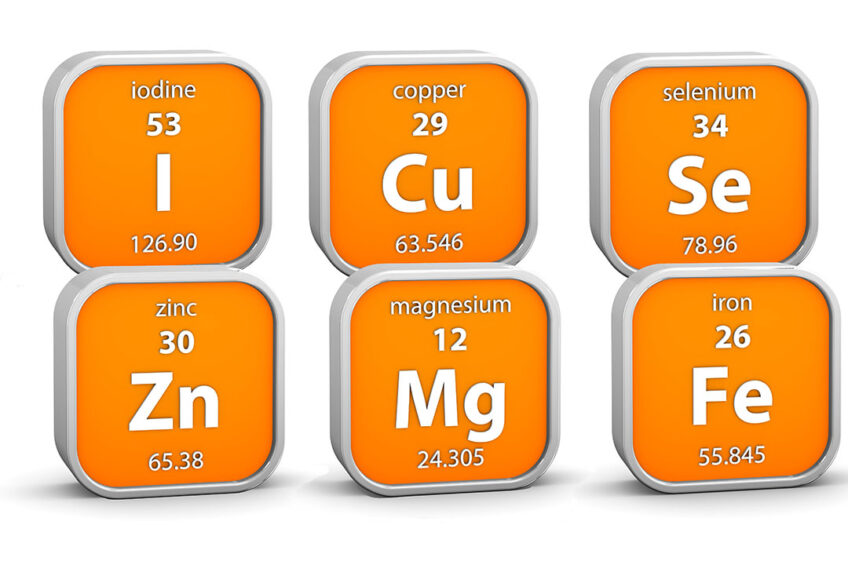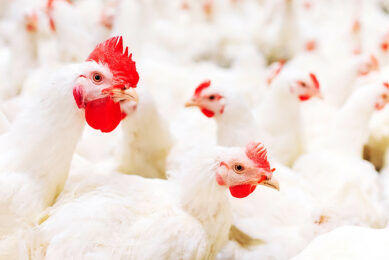Top 6 trace minerals required in poultry diets

Trace minerals are essential components in commercial poultry diets due to their impact on various metabolic processes and functions. In this article we look at the trace minerals of primary concern in poultry diets include zinc, copper, iron, manganese, selenium, and iodine.
Generally, feedstuffs used in poultry diets contain inadequate concentrations of trace minerals, therefore, trace minerals are supplemented either in the premix or separate from the premix formulation. Yet, there is limited knowledge about trace mineral requirements of poultry which leads to the adoption of large safety margins to avoid deficiencies. Although, this approach results in excessive mineral excretion with severe implications for environmental pollution.
 Zinc
Zinc
Zinc is crucial for growth, maintenance, bone and feather development, and appetite control in poultry. In addition, zinc is a component of metalloenzymes including carbonic anhydrase, carboxypeptidases, and DNA polymerases. Carbonic anhydrase is essential for eggshell formation in laying hens, and carboxypeptidases and DNA polymerases are essential for immune response, skin and wound healing, and hormone production such testosterone and corticosteroids. Zinc deficiency in poultry leads to suppressed immune system, poor feathering and dermatitis, infertility, and reduced shell quality. Zinc is commonly supplemented to formulated poultry diets at the level of 0.012-0.018% on the total weight basis.
 Copper
Copper
Copper maintains proper body functions and obtains the optimal growth performance of poultry. Copper is part of various enzymes including ceruloplasmin and lysyl oxidase. Ceruloplasmin is involved in the oxidation of ferrous to ferric iron and controlling the movement of iron from the reticuloendothelium to liver and plasma, thus affecting red blood cell formation. Lysyl oxidase is a fundamental enzyme in elastin and collagen formation in poultry. Furthermore, copper plays a role in feather development and feather colour. Copper deficiency leads to microcytic hypochromic anaemia, bone abnormalities, cardiovascular lesions, and aortic ruptures due to abnormal collagen synthesis, and tibial dyschondroplasia in poultry.
 Iron
Iron
Iron is an essential trace mineral with important roles in oxygen and electron transport and DNA synthesis. Iron is widely spread in nature and is present in all ingredients used in commercial poultry diets. Iron is a component of the protein heme in the red blood cell’s protein haemoglobin and in the muscle cell’s protein myoglobin. Haemoglobin and myoglobin play an important role in maintaining normal meat colour which is the visual indicator of meat quality. Iron needs to be provided daily, in a highly available form, due to its rapid turnover rate in poultry. Iron deficiency in poultry results in microcytic, hypochromic anaemia, degraded physiological function, and reduced production performance.
 Manganese
Manganese
Manganese is a naturally occurring element that is required in poultry diets for reproduction and healthy cartilage and bone formation, eggshell development, wound healing, nutrient absorption, and perosis prevention. In young chicken, manganese deficiency results in perosis characterised by swelling and flattening of the hock joint, along with subsequent slipping of the Achilles tendon from the condyles, bone shortening and bowing. In laying hens, manganese deficiency causes decreased egg production, reduced eggshell quality and strength, low hatchability, and diminished fertility.
 Selenium
Selenium
Selenium is a unique trace mineral with a limited inclusion rate (30 ppm) in poultry diet. Selenium is a component of glutathione peroxidase which is an enzyme involved in cell defence against oxidation. In addition, it plays an important role in the prevention of exudative diathesis, normal pancreatic function, and fertility. Selenium affects the absorption and retention of vitamin E and dietary selenium along with Vitamin E boost the immune status of poultry. Selenium deficiency leads to decreased productive and reproductive performance, and inadequate antioxidant defences in stress conditions.
 Iodine
Iodine
Iodine regulates the body temperature, improves muscles and nerve’s function, controls the proportion of cell oxygen during metabolism, increases growth and reproduction, keeps skin, feathers, spurs and beak healthy, metabolizes excess fat, prevents goitre disease, treats fowl pox, avian goitre, and gastrointestinal illnesses, and develops maximum productive potential. Selenium deficiency causes slow growth, increases size of the thyroid glands, decreases egg production and hatchability of eggs, prolongs incubation time, delimits the productive potential of poultry, and leads to various nutritional diseases. On the other hand, excessive amounts of iodine can cause toxicity and low egg production and egg hatchability.











